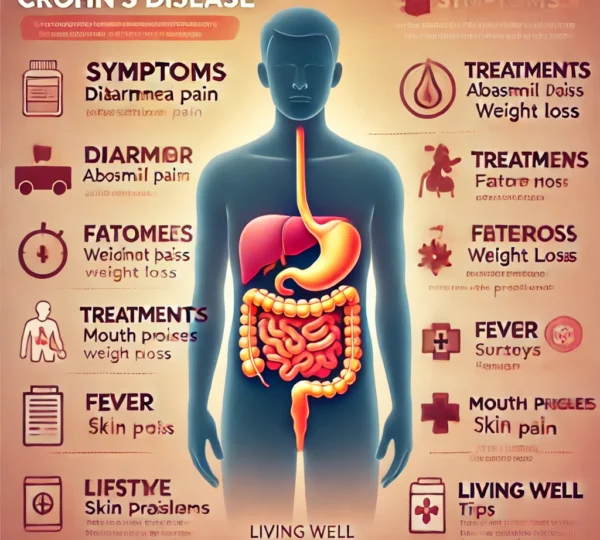How to Live a Full Life with Crohn’s Disease
Crohn’s disease is a chronic inflammatory bowel disease (IBD) that causes inflammation in the digestive tract. It can affect any part of the system, from the mouth to the anus, impacting quality of life.
Although managing Crohn’s disease can be challenging, understanding its symptoms, treatments, and lifestyle strategies is essential.
Common Symptoms of Crohn’s Disease
People with Crohn’s disease often experience a range of symptoms that can vary widely. Here are some of the most common signs:
- Diarrhea: Persistent or recurring diarrhea is a frequent symptom.
- Abdominal Pain: Pain or cramping in the abdomen can interfere with daily activities.
- Fatigue: Chronic tiredness often accompanies Crohn’s disease.
- Weight Loss and Fever: Sudden weight loss and low-grade fever are also common.
- Mouth Sores and Skin Problems: Sores and skin issues may appear, adding to the discomfort.
- Joint Pain: Many people experience pain or swelling in the joints.
Effective Treatment Options for Managing Crohn’s Disease
While Crohn’s disease currently has no cure, there are various treatments to help manage its symptoms. Effective management often includes medication, surgery, and lifestyle changes. Here’s a closer look at some approaches:
- Medication: Anti-inflammatory drugs and immune system suppressors can help reduce inflammation.
- Surgery: In severe cases, surgery might be necessary to remove affected parts of the digestive tract.
- Lifestyle Adjustments: Adopting a healthier lifestyle can significantly improve symptoms and overall health.
Living Well with Crohn’s Disease
Although living with Crohn’s disease requires adjustments, it’s possible to lead a fulfilling life. Here are some key strategies to help you thrive:
- Stay Informed: Regularly learn about Crohn’s disease and stay up-to-date with new research.
- Partner with Your Doctor: Finding a doctor you trust is essential for discussing your best treatment options.
- Manage Stress: Stress often triggers symptoms, so try incorporating stress-reducing activities.
- Focus on Diet: Avoiding trigger foods and eating a balanced diet can improve digestion.
- Exercise Regularly: Even light exercise can help reduce symptoms and boost energy.
- Prioritize Sleep: Quality sleep is crucial for recovery and can lessen symptom severity.
- Join a Support Group: Connecting with others can provide emotional support and valuable insights.
- Use Available Resources: Support groups and patient advocacy organizations offer information and resources.
Conclusion: Moving Forward with Crohn’s Disease
While Crohn’s disease presents unique challenges, it doesn’t define you. By managing symptoms, following effective treatments, and finding support, you can lead a meaningful life.
Remember, you are not alone—many resources and support networks are available to help you navigate your journey.
For more information Click Here



